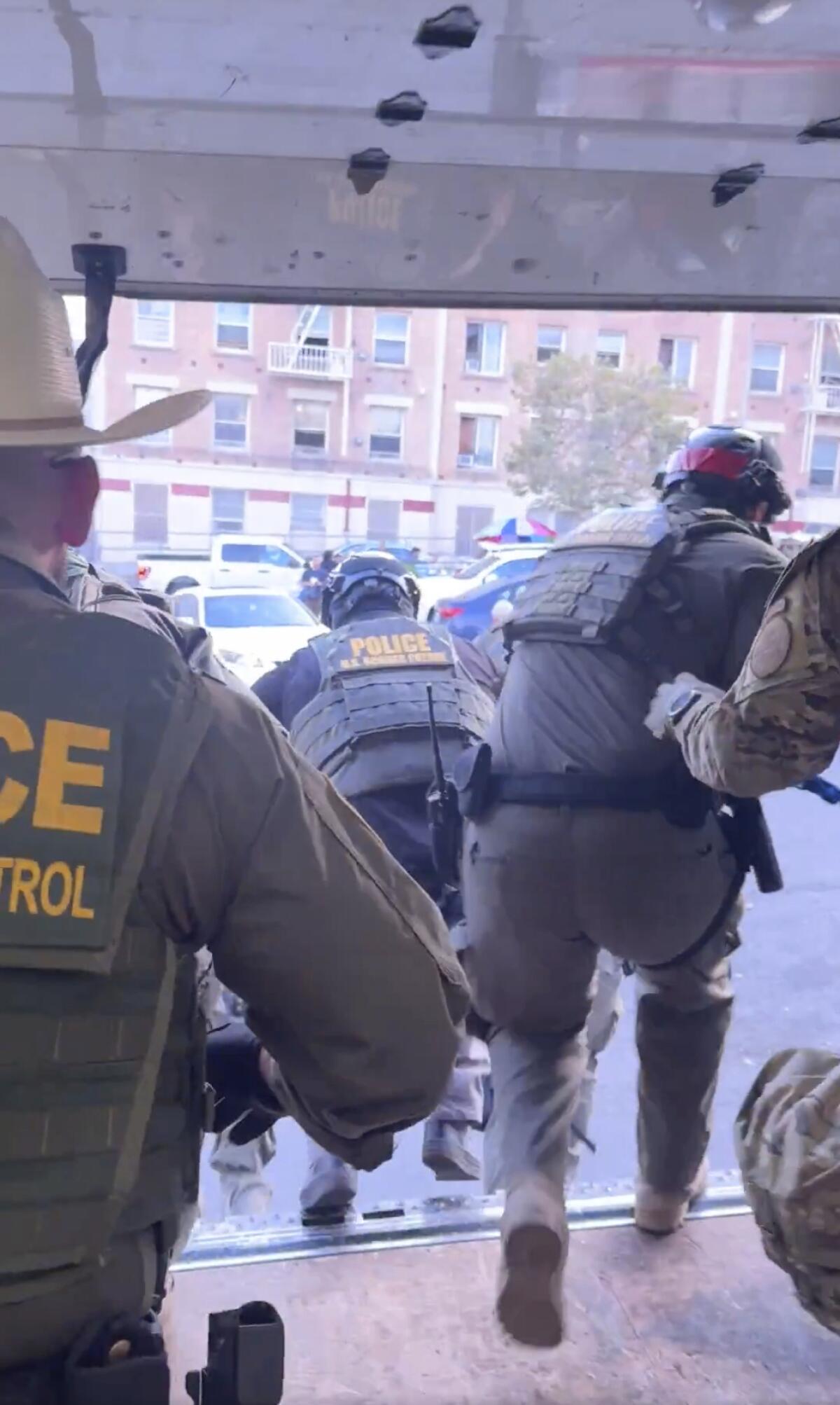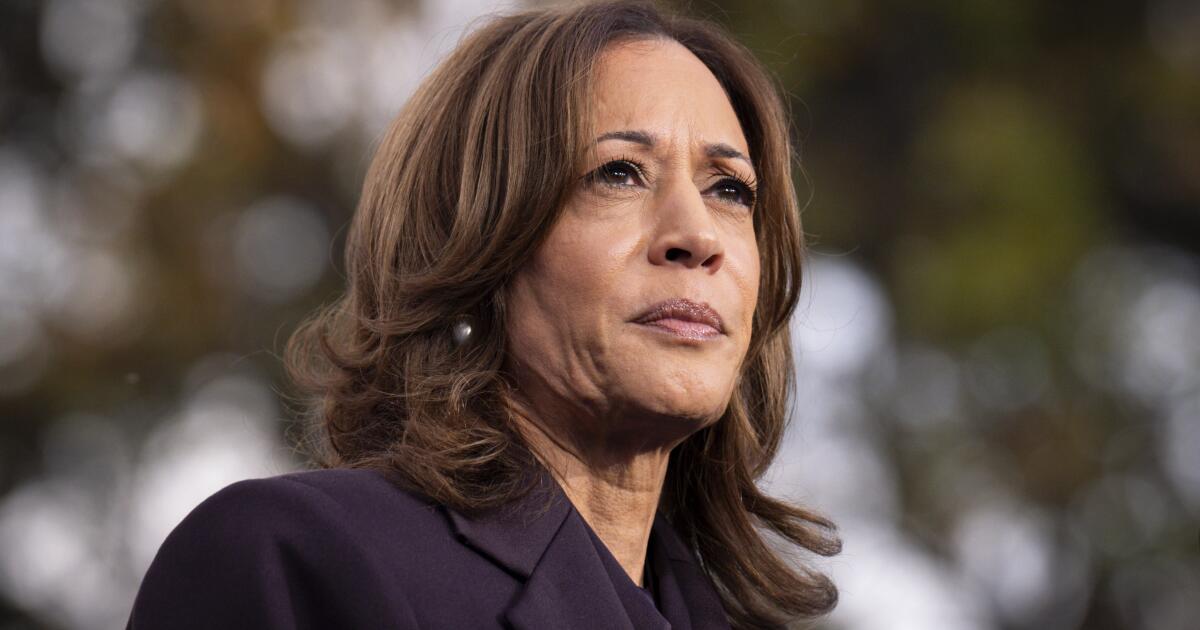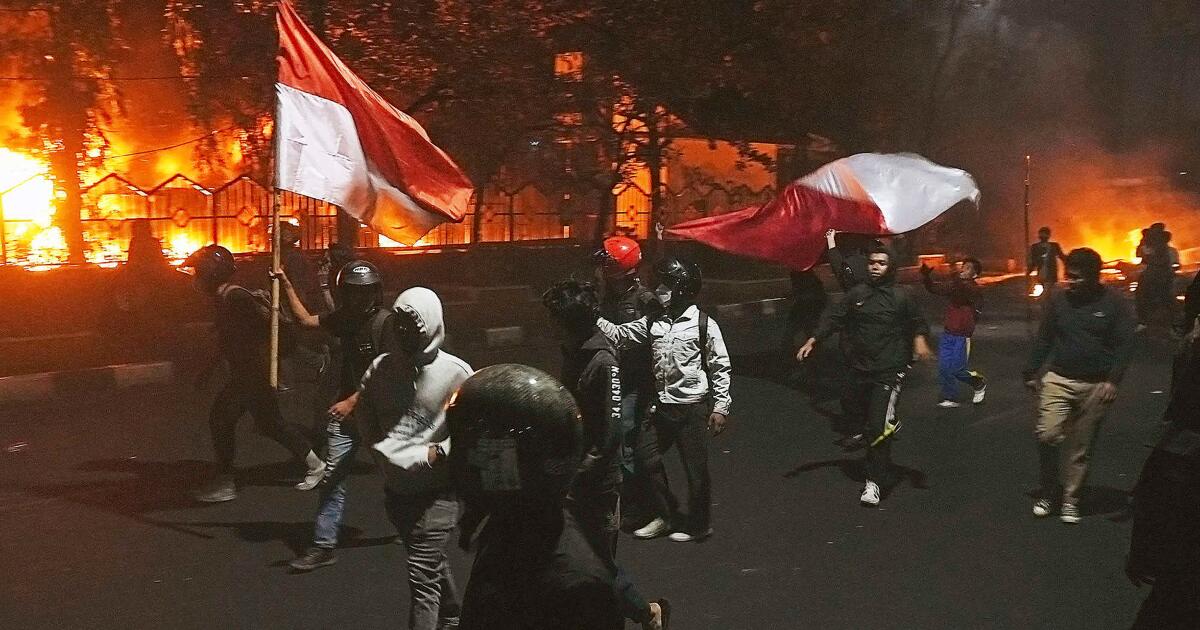Minutes after Defense Secretary Pete Hegseth trumpeted plans to “flood” Washington with National Guard members, a senior U.S. military official took the stand in federal court in California to defend the controversial deployment of troops to Los Angeles.
The move during protests this summer has since become the model for President Trump’s increasing use of the military to police American streets.
But the trial, which opened Monday in San Francisco, turns on the argument by California that troops called up by Trump have been illegally engaged in civilian law enforcement.
“The military in Southern California are so tied in with ICE and other law enforcement agencies that they are practically indistinguishable,” California Deputy Atty. Gen. Meghan Strong told the court Tuesday.
“Los Angeles is just the beginning,” the deputy attorney general said. “President Trump has hinted at sending troops even farther, naming Baltimore and even Oakland here in the Bay Area as his next potential targets.”
Senior U.S. District Judge Charles R. Breyer said in court that Hegseth’s statements Monday could tip the scales in favor of the state, which must show the law is likely to be violated again so long as troops remain.
But the White House hasn’t let the pending case stall its agenda. Nor have Trump officials been fazed by a judge’s order restricting so-called roving patrols used by federal agents to indiscriminately sweep up suspected immigrants.
After Border Patrol agents last week sprang from a Penske moving truck and snatched up workers at a Westlake Home Depot — appearing to openly defy the court’s order — some attorneys warned the rule of law is crumbling in plain sight.
“It is just breathtaking,” said Mark Rosenbaum of Public Counsel, part of the coalition challenging the use of racial profiling by immigration enforcement. “Somewhere there are founding fathers who are turning over in their graves.”
The chaotic immigration arrests that swept through Los Angeles this summer had all but ceased after the original July 11 order, which bars agents from snatching people off the streets without first establishing reasonable suspicion that they are in the U.S. illegally.
An Aug. 1 ruling in the U.S. 9th Circuit Court of Appeals seemed to assure they could not resume again for weeks, if ever.
For the Department of Justice, the 9th Circuit loss was the latest blow in a protracted judicial beatdown, as many of the administration’s most aggressive moves have been held back by federal judges and tied up in appellate courts.
Trump “is losing consistently in the lower courts, almost nine times out of 10,” said Eric J. Segall, a professor at Georgia State University College of Law.
In the last two weeks alone, the 9th Circuit also found Trump’s executive order ending birthright citizenship unconstitutional and signaled it would probably rule in favor of a group of University of California researchers hoping to claw back funding from Trump’s war on diversity, equity and inclusion policies.
Elsewhere in the U.S., the D.C. Circuit Court appeared poised to block Trump’s tariffs, while a federal judge in Miami temporarily stopped construction at the migrant detention center known as Alligator Alcatraz.
California Atty. Gen. Rob Bonta has noted that his Department of Justice had sued the administration nearly 40 times.
But even the breakneck pace of current litigation is glacial compared with the actions of immigration agents and federalized troops.
Federal officials have publicly relished big-footing California Gov. Gavin Newsom and Los Angeles Mayor Karen Bass, who have repeatedly warned the city is being used as a “petri dish” for executive force.
On Monday, the White House seemed to vindicate them by sending the National Guard to Washington.
Speaking for more than half an hour, Trump rattled off a list of American cities he characterized as under siege.
Asked whether he would deploy troops to those cities as well, the president said, “We’re just gonna see what happens.”
“We’re going to look at New York. And if we need to, we’re going to do the same thing in Chicago,” he said. “Hopefully, L.A. is watching.”

This image taken from video shows U.S. Border Patrol agents jumping out of a Penske box truck during an immigration raid at a Home Depot in Los Angeles on Aug. 6, 2025.
(Matt Finn / Fox News via Associated Press)
The U.S. Department of Justice argues that the same power that allows the president to federalize troops and deploy them on American streets also creates a “Constitutional exception” to the Posse Comitatus Act, a 19th century law that bars troops from civilian police action.
California lawyers say no such exception exists.
“I’m looking at this case and trying to figure out, is there any limitation to the use of federal forces?” Judge Breyer said.
Even if they keep taking losses, Trump administration officials “don’t have much to lose” by picking fights, said Ilya Somin, law professor at George Mason University and a constitutional scholar at the Cato Institute.
“The base likes it,” Somin said of the Trump’s most controversial moves. “If they lose, they can consider whether they defy the court.”
Other experts agreed.
“The bigger question is whether the courts can actually do anything to enforce the orders that they’re making,” said David J. Bier, an immigration expert at the Cato Institute. “There’s no indication to me that [Department of Homeland Security agents] are changing their behavior.”
Some scholars speculated the losses in lower courts might actually be a strategic sacrifice in the war to extend presidential power in the Supreme Court.
“It’s not a strategy whose primary ambition is to win,” said professor Mark Graber of the University of Maryland Francis King Carey School of Law. “They are losing cases right and left in the district court, but consistently having district court orders stayed in the Supreme Court.”
Win or lose in the lower courts, the political allure of targeting California is potent, argued Segall, the law professor who studies the Supreme Court.
“There is an emotional hostility to California that people on the West Coast don’t understand,” Segall said. “California … is deemed a separate country almost.”
A favorable ruling in the Supreme Court could pave the way for deployments across the country, he and others warned.
“We don’t want the military on America’s streets, period, full stop,” Segall said. “I don’t think martial law is off the table.”
Pedro Vásquez Perdomo, a day laborer who is one of the plaintiffs in the Southern California case challenging racial profiling by immigration enforcement, has said the case is bigger than him.
He took to the podium outside the American Civil Liberties Union’s downtown offices Aug. 4, his voice trembling as he spoke about the temporary restraining order — upheld days earlier by the 9th Circuit Court of Appeals — that stood between his fellow Angelenos and unchecked federal authority.
“I don’t want silence to be my story,” he said. “I want justice for me and for every other person whose humanity has been denied.”



